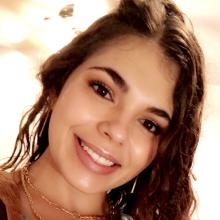
Kirsten Douet
Tell us about your work/research. What kinds of things do you do?
I am currently working on a biodiversity project with Dr. Scott France. This project includes DNA extraction, PCR, and DNA sequencing of select mitochondrial genes from deep-sea bamboo coral specimens collected last summer from the Emperor Seamount chain in the North Pacific Ocean. The results of this project will hopefully aid in elucidating the phylogenies of some of the specimens and identifying the boundary causing great species diversity between northern and southern faunas along the chain. I am enjoying my undergraduate research experience. The process of using scientific methods to explain a natural phenomenon is greatly fulfilling to me and has inspired me to pursue graduate research.
What sparked your initial interest in your career?
For as long as I can remember, I have visited Florida’s Gulf Coast beaches every summer, which initially began my fascination and adoration for the ocean. During these trips, my main concern was always seeing what kinds of animals or seashells I could find by swimming around or digging in the sand. I wondered about how these animals lived, what they ate, and why they looked the ways they did. I like to believe I have always been a marine scientist at heart. On my annual trip in July 2018, I decided that I loved the ocean and marine life so much that I wanted to pursue an education, and ultimately, a career in the field of marine science. Later that same year, I took an Invertebrate Zoology course with Dr. Scott France and discovered my passion for learning about marine invertebrates, especially cnidarians.
Who influenced you or encouraged you the most?
My former professors, Dr. Scott France and Dr. Beth Stauffer, greatly influenced my interests in ocean science through their amazing lectures and labs in their Invertebrate Zoology and Estuarine Ecology courses, respectively. Once they found out I was interested, they encouraged me to explore my interests and pursue a career in this field. They often give me advice, help me expand my network, send me cool articles or paper they think will interest me, and notify me of opportunities, including this internship. I am very thankful for them.
What element of your work/study do you think is the most fascinating?
The most fascinating thing I do in my research is being able to handle and examine samples of bamboo coral specimens. Before macerating polyps to perform DNA extractions, I admire their intricate morphologies. I also have to record the depths at which they were collected, which never ceases to amaze me that these delicate creatures live at depths between 1000 to 2500 m below the surface.
What other jobs led you to your current career?
I wouldn't say that the job I currently hold is a career since I am a waitress and a full-time student. I do hope that through my undergraduate research and this ocean science internship I will be led in the direction of my future dream career.
What are your degrees and certifications?
Bachelor of Science in Biology -- the University of Louisiana at Lafayette (expected) May 2020
What are your hobbies?
I love being in nature, gardening, and watching my fish tank. I also enjoy exercise and meditation.
How did you get involved with the Ocean Exploration Trust?
I applied for the SEIP after learning about the program from Dr. France.
What advice would you give someone who wants to have a career like yours?
If you are working part-time as a full-time student, I would say focus on school even if that means taking time off to study because your GPA will make you stand out when applying for jobs and graduate programs. If you are interested in marine science, you should take courses relevant to your interests and do some research on your professors and other members of the biology department at your university to see what they are studying. You should get in touch with staff members whose work you admire to see if they have openings for undergraduate research in their labs, know of any opportunities or experiences that would benefit you, or have any advice or contacts for the kind of career you want to pursue.
